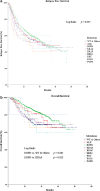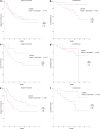Prevalence and clinicopathological characteristics of ALK fusion subtypes in lung adenocarcinomas from Chinese populations
- PMID: 26646246
- PMCID: PMC11818960
- DOI: 10.1007/s00432-015-2081-4
Prevalence and clinicopathological characteristics of ALK fusion subtypes in lung adenocarcinomas from Chinese populations
Abstract
Purpose: We performed this retrospective study to have a comprehensive investigation of the clinicopathological characteristics of ALK fusion-positive lung adenocarcinoma in Chinese populations.
Methods: We screened 1407 patients with primary lung adenocarcinoma from October 2007 to May 2013. Quantitative real-time PCR (qRT-PCR), reverse transcriptase PCR (RT-PCR), and fluorescence in situ hybridization were performed to detect ALK fusion genes, with validation of positive results using immunohistochemistry. Clinicopathological characteristics were collected to assess prognosis in ALK fusion-positive patients.
Results: Of 1407 patients with lung adenocarcinoma, there were 74 (5.3 %) ALK fusion-positive patients. Patients harboring ALK fusion were significantly younger (56.0 years vs. 59.8 years p = 0.002) and were more likely to have advanced stages (stage III or stage IV) (OR 1.761; 95 % CI 1.10-2.82, p = 0.017). Lepidic predominant adenocarcinoma was rarely found in ALK fusion patients (2.7 vs. 13.5 % p = 0.025), while IMA (invasive mucinous adenocarcinoma) predominant adenocarcinoma was more frequently found (21.6 vs. 5.0 % p < 0.001). ALK fusion was neither a risk factor nor protective factor in relapse-free survival and overall survival. Male, current smoker, and EML4-ALK variant 3 indicated poor prognosis among ALK fusion-positive lung adenocarcinomas.
Conclusions: ALK fusion was detected in 5.3 % (74/1407) of the Chinese patients with lung adenocarcinoma. ALK fusion defines a molecular subset of lung adenocarcinoma with unique clinicopathological characteristics. Different ALK fusion variants determine distinct prognoses.
Keywords: ALK; Lung adenocarcinoma; Prognosis; Subtypes.
Conflict of interest statement
The authors declare that they have no conflict of interest.
Figures





Similar articles
-
Clinicopathologic characteristics of ALK rearrangements in primary lung adenocarcinoma with identified EGFR and KRAS status.J Cancer Res Clin Oncol. 2014 Mar;140(3):453-60. doi: 10.1007/s00432-014-1584-8. Epub 2014 Jan 18. J Cancer Res Clin Oncol. 2014. PMID: 24442099 Free PMC article.
-
ALK, ROS1 and RET fusions in 1139 lung adenocarcinomas: a comprehensive study of common and fusion pattern-specific clinicopathologic, histologic and cytologic features.Lung Cancer. 2014 May;84(2):121-6. doi: 10.1016/j.lungcan.2014.02.007. Epub 2014 Feb 19. Lung Cancer. 2014. PMID: 24629636
-
[Detection of lung cancer driver genes by next-generation sequencing: a comparative analysis of plasma and histological/cytological samples].Zhonghua Bing Li Xue Za Zhi. 2025 Jul 8;54(7):755-761. doi: 10.3760/cma.j.cn112151-20241111-00747. Zhonghua Bing Li Xue Za Zhi. 2025. PMID: 40619265 Chinese.
-
Clinicopathological and demographical characteristics of non-small cell lung cancer patients with ALK rearrangements: a systematic review and meta-analysis.PLoS One. 2014 Jun 24;9(6):e100866. doi: 10.1371/journal.pone.0100866. eCollection 2014. PLoS One. 2014. PMID: 24959902 Free PMC article.
-
Prognostic value of K-RAS mutations in patients with non-small cell lung cancer: a systematic review with meta-analysis.Lung Cancer. 2013 Jul;81(1):1-10. doi: 10.1016/j.lungcan.2013.03.019. Epub 2013 Apr 19. Lung Cancer. 2013. PMID: 23608713
Cited by
-
A systematic dissection of the epigenomic heterogeneity of lung adenocarcinoma reveals two different subclasses with distinct prognosis and core regulatory networks.Genome Biol. 2021 May 17;22(1):156. doi: 10.1186/s13059-021-02376-1. Genome Biol. 2021. PMID: 34001209 Free PMC article.
-
Clinicopathological features and diagnostic methods of ALK fusion‑positive non‑small cell lung cancer in Korea.Oncol Rep. 2020 Jan;43(1):218-228. doi: 10.3892/or.2019.7399. Epub 2019 Nov 4. Oncol Rep. 2020. PMID: 31746406 Free PMC article.
-
Characteristics and Prognostic Nomogram for Primary Lung Lepidic Adenocarcinoma.Can Respir J. 2022 Aug 31;2022:3676547. doi: 10.1155/2022/3676547. eCollection 2022. Can Respir J. 2022. PMID: 36091329 Free PMC article.
-
Non-small cell lung cancer in China.Cancer Commun (Lond). 2022 Oct;42(10):937-970. doi: 10.1002/cac2.12359. Epub 2022 Sep 8. Cancer Commun (Lond). 2022. PMID: 36075878 Free PMC article. Review.
-
Comparison of clinical and radiological characteristics between anaplastic lymphoma kinase rearrangement and epidermal growth factor receptor mutation in treatment naïve advanced lung adenocarcinoma.J Thorac Dis. 2017 Oct;9(10):3927-3937. doi: 10.21037/jtd.2017.08.134. J Thorac Dis. 2017. PMID: 29268403 Free PMC article.
References
-
- Chiarle R, Voena C, Ambrogio C et al (2008) The anaplastic lymphoma kinase in the pathogenesis of cancer. Nat Rev Cancer 8:11–23 - PubMed
-
- Choi YL, Takeuchi K, Soda M et al (2008) Identification of novel isoforms of the EML4-ALK transforming gene in non-small cell lung cancer. Cancer Res 68(13):4971–4976 - PubMed
Publication types
MeSH terms
Substances
LinkOut - more resources
Full Text Sources
Medical
Research Materials
Miscellaneous

